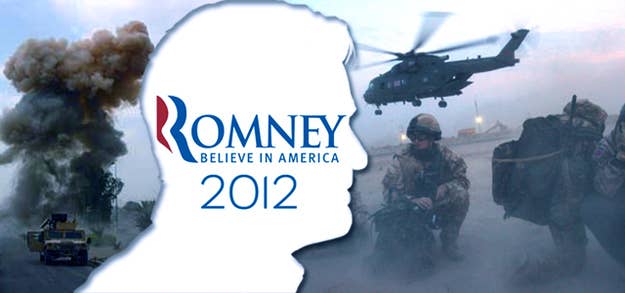
The Obama campaign has begun in recent weeks to probe Mitt Romney’s foreign policy credentials for political weakness, raising a series of questions.
What, exactly, is his foreign policy? His position on Afghanistan? War with Iran? Does he truly believe Russia is the biggest threat to national security?
But the most important question is, according to Obama officials, who's in his brain trust?
The logic: if Romney is an “empty vessel,” as Colin Kahl, a former senior Defense Department official and Obama advisor described him in an interview, then the foreign policy ideas of those filling up that vessel are critical to know.
Yet there’s been a certain hesitancy among the Obama camp to characterize Romney’s men as outright “neocons,” or outright anything, really. Just three weeks ago, four Obama advisors who spoke to BuzzFeed refrained from going there, despite plenty of opportunities to take that bait.
Partly, this is a result of campaign strategy to frame all of the attacks on Romney as “backward looking”—a man stuck in some sort of weird Cold War time warp, his national security team lost in a bath salt induced haze.
Partly, the Obama campaign truly didn’t know who he was listening to. And lastly, there's a campaign sensitivity to avoid re-litigating Iraq, a war that Obama as commander in chief, has a much complex relationship to than when he ran for president four years ago as the purest of anti-war figures.
That all changed this week in what campaign officials are describing as the most “aggressive” attack on Romney’s foreign policy to date.
The new Obama campaign line: Mitt Romney is basically John Bolton, at least for now.
On Tuesday night, the re-election effort enlisted one of its heavyweight foreign policy surrogates, Michele Flournoy, to go nuclear on Romney in response to an Op-Ed Bolton, the combative Bush Administration Ambassador to the United Nations, published in the Washington Times. (Flournoy was one of the most senior officials in the Pentagon. Her name is regularly mentioned as possibly being the first female defense secretary.)
Bolton's piece cheered the stumbles in nuclear talks with Iran that he sees as merely a chance for Iran to play for time: "Fortunately, however, the recently concluded Baghdad talks between Iran and the U.N. Security Council’s five permanent members and Germany (P-5+1) produced no substantive agreement. He then complained that nothing "significant" (read: an attack) would happen before November.
Flournoy fired back: “Bolton has made it clear that he’s rooting for American diplomacy to fail and has repeatedly called for a rush to war with Iran.”
Then, she dropped the hammer: “We’ve witnessed such recklessness before. In 2003, John Bolton and other senior Bush administration officials blew past diplomacy and rushed to war in Iraq. After almost 4,500 American lives lost and nearly a trillion dollars later..."
Another Obama campaign official elaborated on the critique in an interview, saying that Bolton "embodies the reckless neoconservative thinking that was largely responsible for getting us into Iraq on false pretenses, degrading our alliances around the world, and hurting our standing overseas." The official went on to say Romney was "embracing" Bolton's policies.
This is about as far as the campaign has gone in tying Romney’s people to Iraq, as well as the neoconservative ideology that animated that war. Campaign officials say that the “neocon tag” isn’t just a sop to the liberal base, who rightly respond to it as kind of bogeyman of the right. It's also a reminder to independent and middle of the road voters who see the policies of Iraq as a "disaster."
The Iraq association may stick to Romney, as he's surrounded himself with other faces of the deeply unpopular war and occupation. His other top foreign policy advisor, Dan Senor, is best known for his job as spokesperson for the Coalition Provisional Authority, co-hosting what correspondents used to call the “Five O’Clock Follies” each day at Saddam’s old palace. (Romney’s ill-fated choice for foreign policy spokesperson—Ric Grenell—was the Bush Administration spokesman at the U.N. through Bolton's tenure.)
Bolton himself has emerged as a conservative campaign star, and since endorsing Romney has stumped with the candidate, deployed first to win primary votes in South Carolina. Bolton, among the Iraq war champions, is not exactly a neoconservative: He lacks that movements enthusiasm for Arab democracy, and was skeptical of American support for change in Egypt. But he has often aligned himself with the hawkish conservative movement, and is one of eight Romney foreign policy advisors who signed on to the Project For A New American Century's calls for war in Iraq.
There is, in fact, little left of the alternate Republican foreign policy tradition, represented by aging "realist" figures like former Secretary of State James Baker and former National Security Advisor Brent Scowcroft. (Neither Scowcroft or Nixon Secretary of State Henry Kissinger has endorsed Romney; Baker did in Houston Wednesday, praising his "proven track record of success.")
It's worth recalling, too, that Romney's record as a domestic moderate never had a foreign policy parallel. When the former Massachusetts governor ran for president four years ago, he stumped on what was then a central neoconservative theme: That America's role in the world was to centrally defeat "radical Jihad" in a global war. He compared the fight to taking on Hitler and Stalin, another favorite trope of the Iraq war hands. With the Obama campaign spoiling for a last fight over Iraq, the Republican shows no signs of backing off the neoconservative cause.
